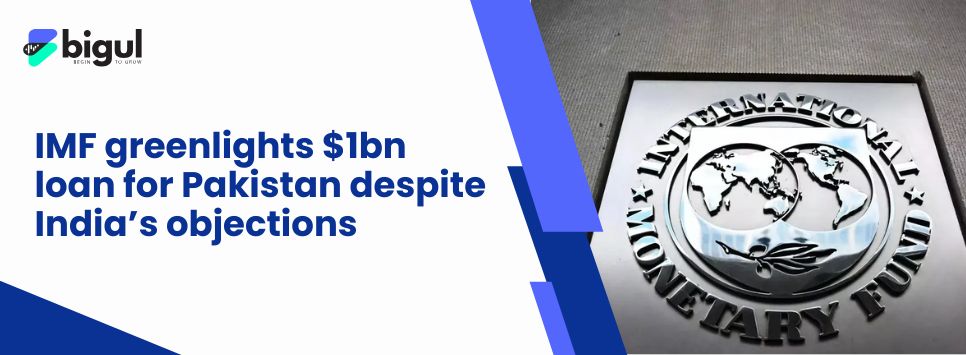IMF has recently approved a $1 billion loan for Pakistan. The decision came on May 10, 2025, despite the strong objections by India. The financial assistance provided by the IMF is a part of a broader economic support package. It has reignited tension between the South Asian nations as India says it will be used for terror financing.
India's concerns mainly centre around Pakistan's track record with IMF loans and fears that the given funds could be misused to support terrorism. Meanwhile, Pakistan views this loan as a vital lifeline for its struggling economy.
Let’s explore the context of the loan and India’s objections and wider implications for both countries and the region.
Also Read | SoftBank Woes Force OYO to Push Back IPO Yet Again
Background: Pakistan’s Economic Struggles and the IMF Lifeline
Various challenges such as surging inflation, increasing debt and chronic balance of payment crisis have faced Pakistan. Pakistan has from time to time sought help from the IMF. In the meantime, the latest $1 Billion disbursement is part of $7 Billion Extended Fund Facility (EFF) agreed upon in July 2024. It was meant to stabilise the Pakistan economy and to ensure reforms in different sectors.
Apart from that, the IMF cleared a different loan for $1.3bn under its Resilience and Sustainability Facility (RSF) so that Pakistan can counter climate-induced issues and this underscores the country’s susceptibility to natural catastrophes.
The approval came two years after an agreement at the staff level in March 2025 that required Pakistan to undertake severe reforms, including the imposition of a carbon levy and rationalisation of energy tariffs. Pakistan’s prime minister, Shehbaz Sharif, lauded the move as an indication of global confidence in the nation’s economic regeneration. However, the loan has come under a lot of criticism, especially from India, a country that had for a long time advised against Pakistan’s repeated reliance on international bailouts and the alleged improper use of the same.
India’s Objections: Economic and Security Concerns
India has objected emphatically to the IMF’s choice, and it has raised two important issues . Pakistan’s track record of being unable to maintain IMF-mandated reforms and the danger that the money might go to state-sponsored terrorism. In the IMF board meeting, India did not vote and made a formal protest to the fact that the loan could destabilise the region.
The Indian finance ministry had said, “Rewarding continued sponsorship of cross-border terrorism sends a dangerous message,” referring to Pakistan’s history of receiving IMF aid over a long period, having received disbursals in 28 out of the past 35 years, including four in the last five years itself.
There is an increase in concerns from India due to recent security incidents. In April 2025, a terrorist operation in Pahalgam, Jammu & Kashmir, took the lives of 26 people and was connected to a Pakistan-based militant group. New Delhi has accused Pakistan of directing international aid for military use or terrorist activity instead of attacking economic fundamentals, while warning that the military may take over Pakistan’s governance and stall the necessary reforms.
Implications: Relief for Pakistan, Tensions for India
To Pakistan, the $1 billion loan provides much-needed breathing space to support urgent fiscal requirements and stabilise the economy. The extra $1.3 billion of RSF funding will support a fight on climate change, which is a major issue for a flood-prone country. Sharif’s government has portrayed the IMF’s move as a diplomatic win in sabotaging Pakistan’s recovery by “unilateral aggression” on its part.
Pakistani officials contend that the loan will help prop up important reforms by creating a path for sustainable growth, but for India, the approval has increased diplomatic tension. By not participating in the vote at the IMF and by criticising this issue pointedly, India is expressing the frustration it feels about what it believes to be an international failure to hold Pakistan accountable.
In a warning, New Delhi says the decision may embolden Pakistan to continue with destabilising activities, heightening instability in the region. The action also makes for messier international politics as the US and the G7 countries are urging dialogue between the two countries and China, as the biggest creditor of Pakistan, also factors in.
Conclusion: Navigating Economic Aid and Geopolitical Risks
The IMF’s agreement to provide Pakistan a $1 billion loan, against the protests of India, is an illustration of how economic necessity has to be spliced with regional security in a complex manner. For Pakistan, the funds form a lifeline during dire financial straits, but India’s musings about misuse and ineffective reforms raise some doubt over the meaning of this kind of support in the long term. As the waters of tension begin to boil between these bordering nuclear powers, the world community must tread a careful line between the pressing necessity for economic help and the necessity of solving fundamental security problems.
In the end, the loan will highlight the necessity for more careful decisions in the area of global finance, and the effort toward dialogue between India and Pakistan must be renewed. Even though the funds could help stabilise Pakistan’s economy in the short run, their overall repercussions, both in terms of economy and geopolitics, are going to be a function of how the two countries use them and whether or not the two can get past their deep-seated rivalry to seek a path to cooperation.
Also Read | India’s April GST Collections Climb to Rs 2.36 Lakh Crore, 12.6% YoY Surge








.jpg)
 1.jpg)
.jpg)
